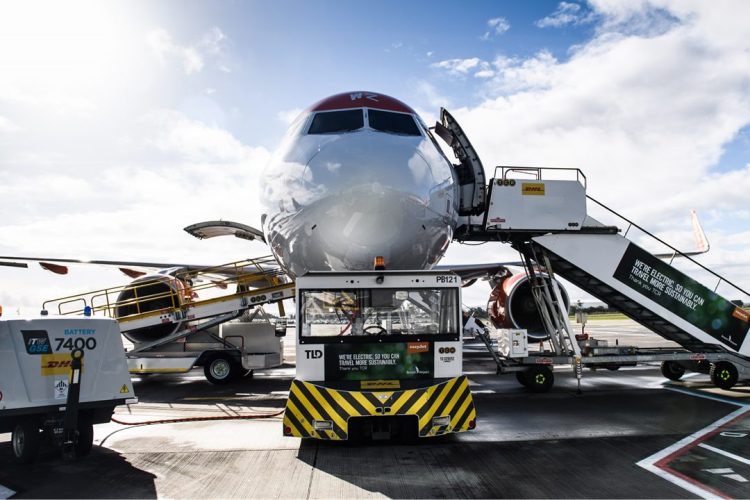Preparing the UK for hydrogen-powered flight
- Like
- Digg
- Del
- Tumblr
- VKontakte
- Buffer
- Love This
- Odnoklassniki
- Meneame
- Blogger
- Amazon
- Yahoo Mail
- Gmail
- AOL
- Newsvine
- HackerNews
- Evernote
- MySpace
- Mail.ru
- Viadeo
- Line
- Comments
- Yummly
- SMS
- Viber
- Telegram
- Subscribe
- Skype
- Facebook Messenger
- Kakao
- LiveJournal
- Yammer
- Edgar
- Fintel
- Mix
- Instapaper
- Copy Link
Posted: 5 December 2023 | Dave Lees | No comments yet
Hydrogen presents the opportunity to decarbonise aviation, particularly for short-haul flights. For International Airport Review, Dave Lees, CEO of Bristol Airport explains how its work as part of the Hydrogen in Aviation alliance is already solving many of the technical challenges of making hydrogen-powered flight a reality.


Alliance with easyJet. CREDIT: BRISTOL AIRPORT
The end of the COVID-19 pandemic reminded me why I love working in aviation. When travel restrictions were finally lifted, Bristol Airport witnessed emotional reunions of families and friends who had been separated for over two years. To be able to play a part in that was a privilege. Air travel connects us and has become widely accessible in recent decades, but unless we take radical action, and act with pace, the necessity of cutting emissions will drive up costs until flying again becomes the preserve of the wealthy.
That doesn’t have to happen – and airports have a critical role to play. New ground infrastructure at airports is essential for zero emissions flight to become a reality. Hydrogen-powered flight is expected to come to fruition in 2035, when Airbus’ planned short-haul aircraft becomes commercially available. It is obvious that these aircraft will need somewhere to take off and land, and Airbus is already saying that the lack of ground infrastructure is the biggest risk to zero emissions flight.
The Hydrogen in Aviation alliance
In just 12 years, airports must not only build hydrogen-refuelling infrastructure, but ensure we have a resilient and cost-effective supply chain in place, have an updated regulatory and safety regime, develop skills, and create new business models. This is too much to do alone, which is why we have joined the Hydrogen in Aviation (HIA) alliance, made up of easyJet, Airbus, Rolls Royce, GKN Aerospace, and Ørsted.
This new alliance brings together expertise that is already solving many of the technical challenges of hydrogen-powered flight. Rolls Royce has carried out ground testing of a hydrogen-powered engine in partnership with easyJet, Airbus are leading development of the aircraft for 2035, GKN Aerospace are working on hydrogen propulsion, and Ørsted bring expertise on generation and storage.


Launch of Hydrogen in Aviation Alliance in Parliament. CREDIT: BRISTOL AIRPORT
The HIA alliance aims to work together with the UK Government to seize the opportunities presented by zero emissions flight. Our country is uniquely positioned to lead its development, which could create 60,000 high-value jobs. The alliance is asking to work with the UK Government to ensure regulation is hydrogen-ready, that there is support for infrastructure, and that R&D support is put on a longer-term footing.
Unlocking hydrogen fuel’s potential
For Bristol Airport, hydrogen presents the opportunity to decarbonise the majority of our routes. We primarily provide low-cost, European destinations for around 10 million passengers a year in the South West of England and South Wales. easyJet, our largest airline and one of the world’s largest, has identified hydrogen as a solution for short-haul flight that will complement the use of sustainable aviation fuel (SAF) for long-haul.
Our location in the UK’s aerospace hub, centred in the South West of England, enables Bristol Airport to act as a testbed for the development of hydrogen flight. As a busy commercial airport, we are unlikely to host the early testing of aircraft. Instead, we can work with partners to develop regulations, build the safety case, and answer questions around storage. A number of smaller trials, for example with hydrogen-powered ground equipment in the airside operational environment, will be the first steps towards hydrogen flight. The sharing of data, the experience of our employees, and access to our airside areas are at this stage more valuable than access to our runway.


easyJet and Bristol Airport. CREDIT: BRISTOL AIRPORT
Bristol Airport wants to take a leading position on sustainability and we were the first UK airport to commit to achieving net zero operations by 2030. Delivering this relies on electrification – replacing diesel vehicles and equipment, heat pumps replacing natural gas heating, and cutting energy use. Hydrogen could power our longer-distance bus services from 2030, but the fuel’s primary role will be supplying aircraft.
The need for regulation to keep pace with hydrogen’s rapid development
The creation of the Hydrogen in Aviation alliance to make the call for national changes to policy and regulation complements our existing efforts in the region. We led the creation of Hydrogen South West, a consortium of scores of companies from multiple sectors with a shared interested in creating a hydrogen economy in our region. Our expectation is that this regional group will enable us to have a reliable, cost-effective supply of hydrogen and the means to move it to the airport.
The writing of new regulations and safety rules, gaining an understanding of customer reaction to the fuel, developing skills, and identifying hydrogen storage requirements need to happen soon. After decades of incremental technological change in aviation, the rapid development of hydrogen-powered flight has means that policymakers and regulators are understandably playing catch-up. Bristol Airport and the HIA alliance aim to provide the tools and data so our stakeholders can create the climate for the significant investment that will be required.
As our next steps, Bristol Airport is in the process of producing demand and storage forecasts in partnership with Airbus. Early in 2024, we plan to undertake ground trials at the airport, with regulators forming part of the project team, to begin to meet the challenges the sector has identified.
The role of airports is going to change. Rather than just being facilitators of flights, we will play a critical role in enabling the decarbonisation of aviation. Successfully doing that will require us to work with new partners, often from unrelated sectors, and develop new business models, with many airports becoming hydrogen hubs for ground transport, heating and industry. This presents new and exciting opportunities for growth.
Bristol Airport is England’s third largest regional airport, acting as the international gateway for the South West of England and South Wales. It provides links to over 120 destinations, more than all the other airports in the region combined, including to major hub airports for onward connections.
We are central to our region’s economy, providing business links to European capitals and financial hubs, and bringing in hundreds of thousands of inbound visitors each year. Bristol Airport is our area’s largest private sector employer, with some 3,750 full-time equivalent jobs being provided on-site by over 50 companies, all paying more than the Living Wage.


CREDIT: BRISTOL AIRPORT
About the author – Dave Lees
Dave Lees has worked in aviation for over 30 years at a range of UK Airports including Heathrow, Stansted, and Southampton amongst others before joining Bristol as CEO in 2018. Dave has led the business through a challenging period however, post pandemic, Bristol has emerged as the fastest recovered UK Airport and has taken a leading position on moving to net carbon zero operations by 2030.
Related topics
Airlines, Emissions, Green energy, Sustainability, Sustainable development


















